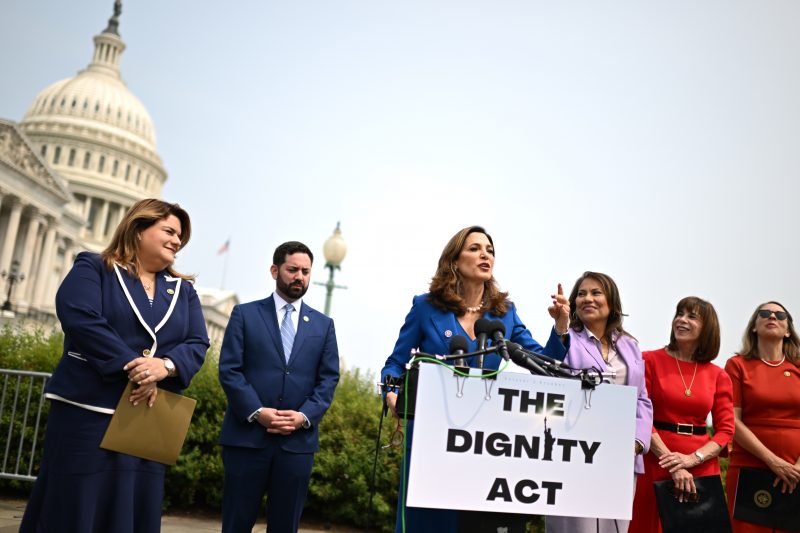A bipartisan duo of Hispanic women Tuesday introduced the most robust immigration proposal to date this Congress, a significant collaboration as a new generation of lawmakers pushes for meaningful reform of the nation’s immigration system after decades of failed attempts.
For six months, Reps. Maria Elvira Salazar (R-Fla.) and Veronica Escobar (D-Tex.) have been quietly negotiating on key issues where Republican and Democrats have previously sought changes, while leaning on their lived experiences as lawmakers representing border districts with majority Hispanic constituencies.
The result is a roughly 500-page bill called the Dignity Act that, among other things, would provide billions of dollars for border security measures, create pathways to citizenship for some undocumented migrants already in the United States, update the legal immigration process, and establish “humanitarian campuses” on the U.S. border that would process asylum claims in 60 days.
The bipartisan bill is another step in the effort to force a conversation between the parties as immigration-related issues continue to affect communities around the country. A growing group of lawmakers, who were elected after the last push for comprehensive immigration reform failed in 2013, is eager to engage in the debate, while many who came before them have lost hope. Salazar called immigration reform “the most toxic topic in Congress.”
Escobar, who represents the border city of El Paso, and Salazar, who represents part of Miami, acknowledge the herculean task they’re attempting in an era of deeply partisan politics.
“We understand that we are trying to open the Red Sea,” Salazar said in a joint interview with Escobar in Salazar’s office on Monday afternoon. “But someone has to try it. Moses did it. Maybe we can do it a second time.”
Salazar and Escobar were joined at a news conference Tuesday by four original co-sponsors who are all women: Reps. Hillary J. Scholten (D-Mich.), Kathy E. Manning (D-N.C.), Lori Chavez-DeRemer (R-Ore.) and Del. Jenniffer González-Colón (R-Puerto Rico.). Rep. Michael Lawler (N.Y.), a vulnerable Republican representing a Democratic-leaning district, signed onto the measure late Monday and also attended. Rep. Adriano Espaillat (D-N.Y.) also signed on Tuesday.
The partnership is the first bipartisan bill since 2013 that includes a path to citizenship for adult undocumented immigrants and changes legal immigration pathways that have prevented many from acquiring visas. It is also the first time a group of women have pushed such reforms, given that the notable “Gang of Eight” from 2008 and those who spearheaded the 2013 effort were largely White men.
The bill’s introduction comes after House Republicans passed a border security bill this month along party lines; House Republican leaders have said since last year that consideration of a large-scale immigration overhaul would not happen until a border security plan had passed the chamber.
Asked whether broad immigration legislation could be considered this year, Majority Leader Steve Scalise (R-La.) appeared to suggest last week that it would not happen until a border security plan is signed into law.
“We’ve got to first start with border security,” he said, before adding that it would mean getting such a bill to the president’s desk. “If we get that done, then you can start talking about the interior problems that exist.”
Salazar was elected to Congress in 2020 when she flipped a district that had helped Democrats take the House majority in the 2018 midterms. Born in Miami’s Little Havana neighborhood to Cuban exiles, Salazar, a former broadcast journalist for Univision and Telemundo, made it her top priority to pass immigration reform and first introduced a framework for the Dignity Act in 2021.
Escobar, a third-generation El Pasoan, spent 30 years focused on immigration reforms including while serving in local government. She ran to represent her hometown in Congress after Rep. Beto O’Rourke (D) vacated the seat to seek higher office. She became the first Latina elected congresswoman from Texas alongside Rep. Sylvia Garcia (D) in 2018.
The unlikely pair’s partnership began after Salazar co-sponsored a bill from Escobar that would allow immigration judges and officials to take up cases for U.S. citizens seeking to be reunified with an undocumented spouse or child who has been deported or denied a visa to reenter the country. That proposal is included in their new plan. The lawmakers negotiated one on one for months, avoiding overly partisan remarks as Republicans were crafting their border security bill.
“We’re not here to do a messaging bill,” Escobar said. “We’re not each pursuing the perfect as we see it. We are pursuing a compromise that is real, that is common sense.”
Coming from Hispanic-majority districts, both have heard stories from constituents who know undocumented migrants who came to the United States for better economic opportunities. Salazar explained that the bill got its name in an effort to grant dignity to many “living in the shadows.”
Most notably, the bill would grant legal status to undocumented immigrants who have been in the country for at least five years and who can pass a criminal-background check. Those immigrants would be required to pay $5,000 in restitution over seven years and a 1.5 percent payroll tax, and they would be ineligible for federal benefits. The provision would apply only to undocumented immigrants who arrived in five years before the bill is signed into law.
After seven years, those who have pursued “the dignity path,” as the bill deems it, would be allowed to start the process of seeking citizenship. They would have to wait behind people who have legally applied for citizenship but have not received it because of visa-processing backlogs, which the bill also addresses.
Escobar and Salazar say these payments and other revenue streams included in the bill mean they won’t need to raise taxes to pay for it. The bill also would use some of the money paid by immigrants with legal status to pay for training programs for American workers.
“If you feel that you have lost an opportunity because an undocumented person came and took it away from you, then there’s the pot of money for you to be trained,” Salazar said.
The proposal includes $25 billion in border funding that would not be directed toward a wall but instead would go toward increasing the number of border security personnel, technology and other funding for the U.S. Customs and Border Protection agency.
The bill also would end “catch and release,” the policy of releasing migrants into the country as they await adjudication of their asylum claims. Instead, the bill would redirect migrants seeking asylum to what Salazar and Escobar described as “humanitarian campuses” along the border, where they could live for 60 days while immigration authorities evaluate their claims. The lawmakers argue that such centers would keep families united and ease the burden for Border Patrol agents by allowing nongovernmental organizations, religious groups or others to provide assistance.
The bill also proposes establishing five processing centers in Mexico, Central and South America, and the Caribbean so migrants who are trying to enter the United States can receive accurate information about whether their asylum claim could actually be approved at a port of entry.
“Every time I’m on the border, we are seeing more and more migrants, who to be perfectly candid, will never qualify for asylum,” Escobar said. “The sooner they can be informed about the process, also whether they fit into one of those economic legal pathways, the better, and it accomplishes something else that is critical to all of us — getting them out of the hands of human traffickers.”
The bill would also make it easier to immigrate legally by expanding H-2A and H-2B visas for temporary workers as well as visa programs for highly skilled workers.
The next step for both women is to garner enough support in the House and Senate to determine the pathways for the legislation to become law. Both recognize how politically toxic the issue has become and plan on whipping support within their ideologically divided conferences.
Salazar plans to meet with the staunchly conservative House Freedom Caucus in the near future to explain the planks of her bill, including arguing that it does not grant “amnesty.”
Escobar, who is a member of the Congressional Progressive Caucus, in turn has to sell the legislation to the most liberal flank of her party. She has met with her CPC colleagues as well as with the more moderate New Democrat Coalition, of which she also is a member, while keeping Minority Leader Hakeem Jeffries (D-N.Y.) abreast of her efforts.
“Holding out for the perfect will make the situation worse,” she said. “I have an ideal vision as well. But if I sit on my hands until I’m able to execute on that ideal vision, then the situation will only grow more and more challenging.”
Both women have also worked to get buy-in from another significant hurdle: the Senate. Onboard a flight from Mexico City to the United States in March, Salazar and Escobar pitched their proposal to Sens. John Cornyn (R-Tex.), Mike Lee (R-Utah), Chris Murphy (D-Conn.), Shelley Moore Capito (R-W.Va.), Christopher A. Coons (D-Del.), and Kyrsten Sinema (I-Ariz.). Cornyn, Murphy and Coons have been working with Sinema and Sen. Thom Tillis (R-N.C.) on a framework they released in December.
Salazar and Escobar said all the senators were engaged in the conversation, but that Coons and Cornyn showed the most interest. In a statement, Coons noted that their combined effort “is an important step forward as we work towards a more fair, humane, orderly, and legal immigration system.”
In a sign of their shared determination to enact their legislation into law, both women are open to defying Republican leadership if, once they are able to secure a majority of votes necessary to successfully pass it onto the Senate, leaders fail to put the bill on the floor.
“Nothing is off the table,” Salazar said when asked about the prospects of a discharge petition, a procedural effort that would allow them to bypass the regular pathway for a bill to reach the floor.
Escobar then responded, “All it takes to make this happen is 218 people in the House of Representatives saying that they’re ready for a real solution.”
An earlier version of this story said a news conference for the legislation was Wednesday and that Rep. Michael Lawler (R-N.Y.) signed onto the legislation late Tuesday. The news conference was Tuesday, and Lawler signed on late Monday. The article has been corrected.








